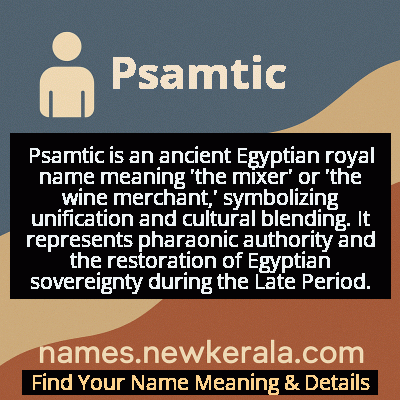Psamtic Name Meaning & Details
Origin, Popularity, Numerology Analysis & Name Meaning of Psamtic
Discover the origin, meaning, and cultural significance of the name PSAMTIC. Delve into its historical roots and explore the lasting impact it has had on communities and traditions.
Name
Psamtic
Gender
Male
Origin
Egyptian
Lucky Number
9
Meaning of the Name - Psamtic
Psamtic is an ancient Egyptian royal name meaning 'the mixer' or 'the wine merchant,' symbolizing unification and cultural blending. It represents pharaonic authority and the restoration of Egyptian sovereignty during the Late Period.
Psamtic - Complete Numerology Analysis
Your Numerology Number
Based on Pythagorean Numerology System
Ruling Planet
Mars
Positive Nature
Generous, passionate, energetic, and humanitarian.
Negative Traits
Impulsive, impatient, moody, and can be overly emotional.
Lucky Colours
Red, maroon, scarlet.
Lucky Days
Tuesday.
Lucky Stones
Red coral, garnet.
Harmony Numbers
1, 2, 3, 6.
Best Suited Professions
Military, sports, philanthropy, leadership roles.
What People Like About You
Courage, energy, leadership, generosity.
Famous People Named Psamtic
Psamtik I
Pharaoh
Reunified Egypt and founded the 26th Dynasty, initiating cultural renaissance
Psamtik II
Pharaoh
Successfully campaigned in Nubia and strengthened Egyptian borders
Psamtik III
Pharaoh
Final native Egyptian ruler who resisted Persian conquest
Name Variations & International Equivalents
Click on blue names to explore their detailed meanings. Gray names with will be available soon.
Cultural & Historical Significance
In Egyptian historiography, the Psamtic pharaohs represent both the culmination of pharaonic tradition and the beginning of Egypt's integration into the Mediterranean world system. Their reigns bridged ancient traditions with emerging classical civilizations, creating a unique synthesis that would influence subsequent periods of Egyptian history. The name thus embodies a crucial transitional period where Egypt maintained its cultural identity while adapting to new geopolitical realities.
Extended Personality Analysis
Individuals named Psamtic are typically perceived as natural leaders with strong organizational abilities and strategic thinking. They exhibit determination and resilience, often demonstrating the capacity to overcome significant challenges through patience and careful planning. Their personality reflects a balance between tradition and innovation—respecting established customs while being open to new ideas and external influences. This makes them effective in roles requiring both stability and adaptation.
Psamtic personalities tend to be diplomatic yet firm in their convictions, capable of building alliances while maintaining core principles. They often possess a deep sense of cultural identity and historical consciousness, drawing strength from their heritage while navigating contemporary complexities. Their leadership style typically combines visionary thinking with practical implementation, making them particularly suited for positions where cultural preservation meets modern advancement. The name suggests someone who values legacy but understands the necessity of evolution.
Modern Usage & Popularity
In contemporary times, Psamtic remains an extremely rare given name, primarily used by Egyptologists, historians, or individuals with strong connections to Egyptian heritage. Its usage is almost exclusively academic or ceremonial rather than practical for daily life. The name occasionally appears in historical reenactment communities and among families seeking to honor their ancient Egyptian ancestry. There are no significant popularity trends as it remains outside mainstream naming conventions, though it has seen minor resurgence in specialized circles interested in reviving ancient Egyptian names. Its complexity and strong historical associations make it challenging for modern adoption, though it serves as a powerful statement of cultural identity for those who choose it.
Symbolic & Spiritual Meanings
Symbolically, Psamtic represents restoration, cultural preservation, and the enduring power of national identity. The name embodies the concept of phoenix-like rebirth from periods of foreign domination and cultural suppression. It signifies the ability to blend tradition with innovation, much like the historical Psamtic rulers who incorporated Greek mercenaries and ideas while maintaining Egyptian cultural integrity. The name also carries connotations of strategic patience and long-term planning, reflecting the methodical approach these pharaohs used to rebuild Egyptian power over decades rather than through immediate confrontation.

